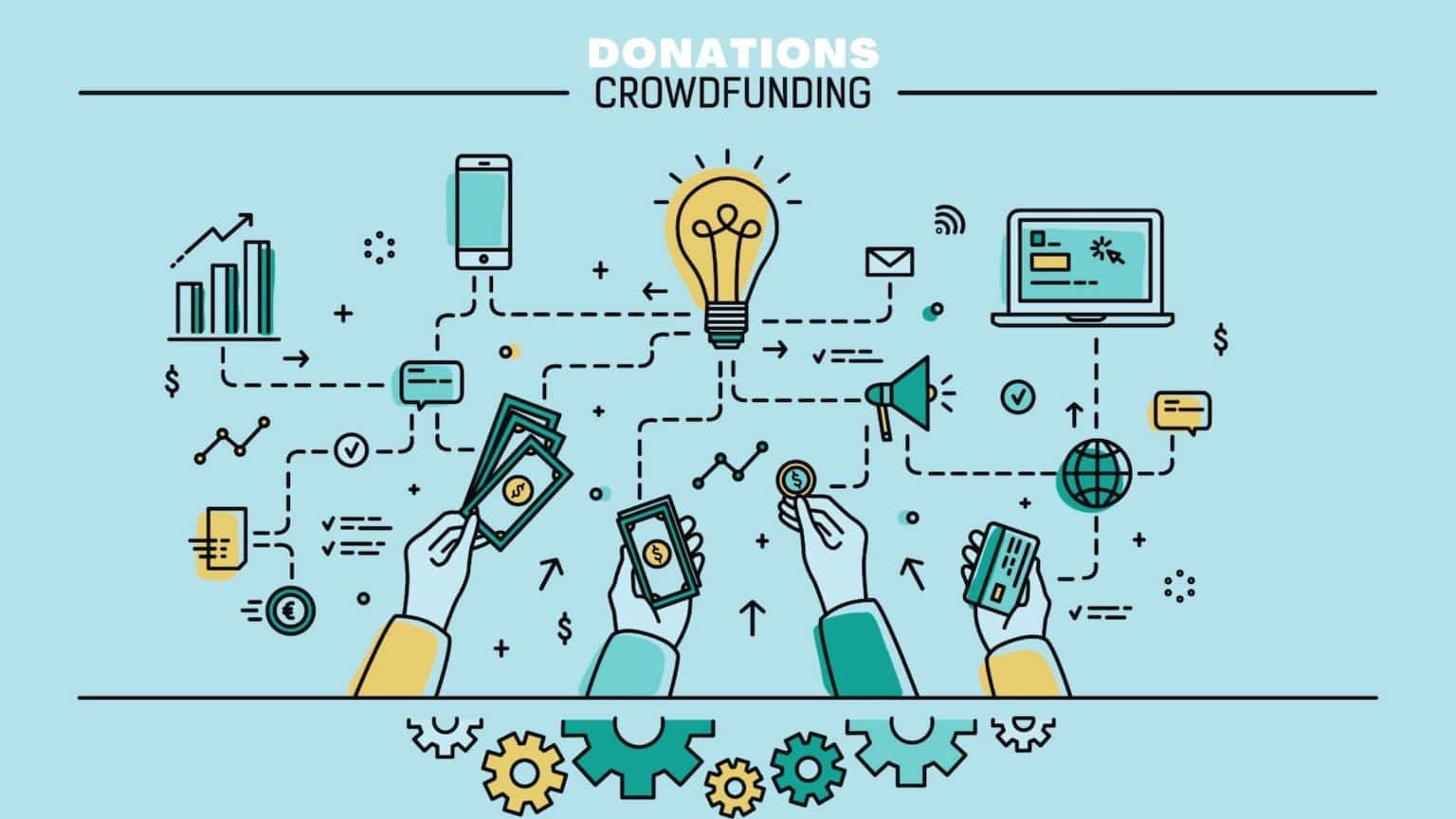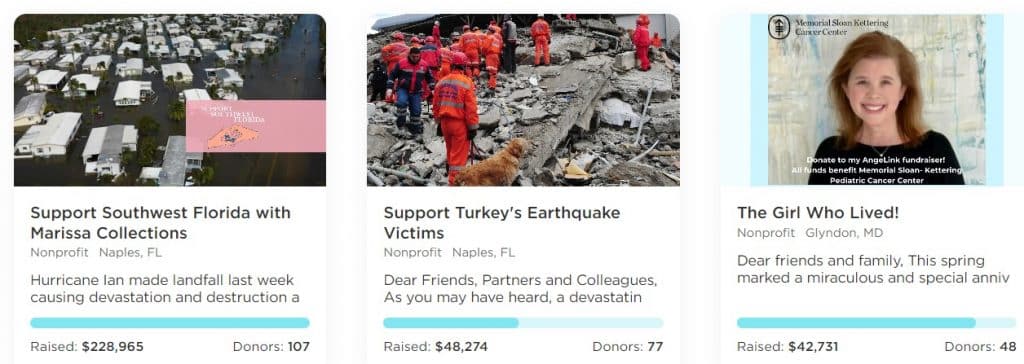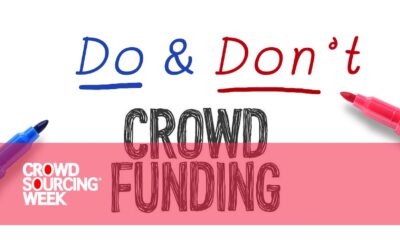Donations crowdfunding has already made a significant impact on the way people support charitable causes. Driven by social media and online platforms, it allows individuals and organizations to access a wider audience of potential donors and has made it easier for people to donate small amounts of money to causes they care about. What does the future hold for donations crowdfunding? To be clear, this article is not about crowdfunding that offers backers a reward of any kind – beyond the warm feeling people get from helping someone else. It is not about crowdfunding to invest in business equity, or to earn interest through lending on a peer-to-peer basis.
Advantages
One of the key advantages of donations crowdfunding is its ability to democratise fundraising. Instead of relying on a small number of wealthy donors, donations crowdfunding allows organisations to use digital technology to tap into the power of the crowd, which can lead to more diverse sources of funding and greater public/citizen engagement.
Another advantage of donations crowdfunding is its ability to create a sense of community around a cause. Donors who contribute to a crowdfunding campaign often feel more connected to the cause and to the other donors who have supported it. This can lead to increased engagement and advocacy for the cause, as well as ongoing support for future fundraising efforts.
One more trend that is likely to continue is the increasing focus on transparency and accountability. Donors want to know exactly where their money is going and how it is being used, and organisations that can demonstrate their impact are likely to be more successful in their fundraising efforts.
Finally, there is likely to be continued growth in niche crowdfunding platforms that cater to specific causes or communities. These platforms can provide a more targeted audience for fundraising efforts and make it easier for donors to find causes they are passionate about. Women represent over 70% of fundraisers and donors in social crowdfunding, and a growing number of platforms cater specifically for this demographic.
What are the most common reasons to ask for donations?
There are many reasons why people may ask for donations, and the reasons can vary widely depending on the individual or organisation. At a personal level, one of the most common reasons people ask for donations is to cover medical expenses. This can include surgery, hospital bills, and ongoing treatment and medicines for chronic illnesses. In addition to medical expenses, people may also ask for donations to support personal emergencies such as job loss, eviction, or unexpected expenses like car repairs.
Many people also ask for donations to support education, whether it’s for a school or a particular project, to support scholarships and grants programmes for students, or on a personal basis when financially-challenged individual students seek support.
On a larger scale, a common reason for donations is to support disaster relief efforts for humanitarian purposes. This can include natural disasters like hurricanes and earthquakes, as well as man-made disasters like terrorist attacks.
Non-profit organisations often rely on donations to fund their programmes and services. This can include organisations that work in areas like animal welfare, human rights, and environmental conservation. Some people may ask for donations to support arts and cultural organisations, such as museums, theatres, and community arts programs. This is often also known as civic crowdfunding.
These are just a few examples of the many reasons why people may ask for donations. Ultimately, the decision to donate is a personal one, and individuals may choose to support causes that are meaningful to them for a variety of reasons.
What market share do the leading donation platforms have?
The donations crowdfunding market is highly competitive and there are many platforms available. Here are some of the most popular platforms and their market share:
GoFundMe is the largest donations crowdfunding platform, with a very dominant market share estimated to have been around 50% in 2020. Its 2022 Giving Report claims the GoFundMe community has raised $25 billion since 2010, for a wide range of causes including medical expenses, education, and disaster relief.
Facebook Fundraisers is a relatively new player in the donations crowdfunding market, but it has already become one of the most popular platforms. It allows individuals and organizations to create fundraising campaigns directly on Facebook, and has an estimated market share of around 20%.
PayPal Giving Fund is a donations platform that allows donors to give to a wide range of charitable organizations. It has a market share of around 10%.
JustGiving is a donations platform based in the UK that supports a wide range of causes. It has a market share of around 5%.
Whilst Kickstarter is mostly known as a popular crowdfunding platform for creative projects, it also supports charitable causes. It has a market share of around 3%.
It’s worth noting that these market share estimates are based on publicly available data and may not be entirely accurate. Additionally, the donations crowdfunding market is constantly evolving, with new platforms entering the market and existing platforms expanding their offerings.
The average donation size and amount raised
Data sources unfortunately include many instances where different types of crowdfunding have been bundled together, and reliable figures for donations-only crowdfunding are hard to find. The average donation also can vary widely depending on the campaign and the cause it supports. Data that is even just a year or two old can give a misleading picture given the general public’s response to appeals during Covid, and the more recent global cost of living crisis. There also seem to be more and more natural disaster appeals and humanitarian catastrophes due to extreme weather conditions attributed to the climate crisis.
Similarly, the average amount raised by campaigns can vary widely depending on the scale of any campaign and the cause it supports. Some campaigns may receive just a few hundred dollars, while others may receive hundreds of thousands or even millions of dollars.
What other platforms are for donations only?
There are several other donations-only crowdfunding platforms that focus specifically on charitable causes. Here are a few examples:
DonorsChoose is a crowdfunding platform that connects teachers in the United States with donors who want to support their classroom projects. Donors can browse through hundreds of projects and choose to support the ones they are most passionate about. DonorsChoose charges a 15% fee on donations to cover the cost of operating the platform.
GlobalGiving is a crowdfunding platform that supports grassroots organisations around the world. It allows donors to choose from thousands of projects and organizations working on issues such as education, health, and economic development. GlobalGiving charges a 5% platform fee, plus a 3% payment processing fee.
Ketto is a crowdfunding platform based in India that focuses on social causes, charities, and personal causes. The platform was founded in 2012 by Varun Sheth, Kunal Kapoor, and Zaheer Adenwala, and has since become one of the largest crowdfunding platforms in India. Users can create campaigns for social and charitable causes, as well as personal causes such as medical expenses, education, and creative projects. Ketto provides tools and resources to help campaigners reach a large audience and raise funds quickly and efficiently.
The platform also partners with a number of NGOs and non-profits to support their fundraising efforts, and has helped raise funds for a variety of causes including disaster relief, education, healthcare, and animal welfare. Ketto also places a strong emphasis on transparency and accountability. The platform has a verification process in place to ensure that campaigners are legitimate and that the funds raised are used for their intended purpose. The platform provides regular updates to donors and supporters on the progress of campaigns and the impact of their donations.
AngeLink is an example of a platform designed specifically for women. It is the world’s first social crowdfunding platform powered by women, based in Florida and launched by founder Gerry Poirer. Over 70% of donations campaign organisers are female, and women make up the vast majority of donors – giving small amounts of money to help each other far more often than men.
The AngeLink platform is designed specifically to empower women entrepreneurs and investors. Its mission is to close the gender gap in funding for women-led startups by providing a platform where women entrepreneurs can showcase their businesses to a community of female backers. The platform also provides resources and mentorship opportunities for women entrepreneurs, with the goal of helping them succeed in their ventures. There is a 0% platform fee, though credit card processing fees still apply.
These are just a few examples of the many donations crowdfunding platforms that are available. Depending on the specific cause or project you want to raise money for or support, there may well be other platforms that are better suited to your needs.
Challenges
Despite its many benefits, donations crowdfunding also faces some challenges. One of the biggest challenges is the potential for fraud and abuse. Crowdfunding campaigns are not always vetted, and there have been cases where individuals or organizations have used crowdfunding to raise money for fraudulent or non-existent causes.
The topic is of particular media interest in India, where the share of GDP (gross domestic product) invested in public healthcare is relatively low, and so many people crowdfund to pay medical expenses. 73% of India’s rural population accesses only 25% of the country’s healthcare infrastructure, and 55 million people are pushed into poverty each year due to healthcare costs. The high volume of crowdfunding projects asking for donations attracts scammers who hope to blend in.
Another challenge for maintaining the popularity of donations crowdfunding is the high fees charged by some crowdfunding platforms. While donations crowdfunding is generally more cost effective than traditional fundraising methods, some platforms charge high fees that eat into the funds raised through donor generousity.
A third challenge is dealing with governments that want to restrict donations that finance activities they do not approve of.
Donations crowdfunding platforms with high fees
There are several donation crowdfunding platforms that charge high fees. Here are three examples.
GoFundMe, which is estimated to have a 50% market share of the donation crowdfunding sector, charges some of the highest fees: a 2.9% payment processing fee, plus a $0.30 per donation fee. It also charges a 5% platform fee, which is deducted from the total amount raised.
Kickstarter is better known as a crowdfunding platform for creative projects, and it charges relatively high fees compared to other donations-only platforms. It charges a 5% platform fee, plus a 3-5% payment processing fee, depending on the location of the donor.
Indiegogo is a popular crowdfunding platform that is better known as a quasi-sales channel for finished products, though it does carry donations-only projects. It charges a 5% platform fee for successful campaigns, plus a 3-5% payment processing fee, depending on the location of the donor.
It’s important to note that while these platforms charge fees, they also offer a range of services to help campaigns succeed, such as payment processing, marketing tools, and customer support. Ultimately, the decision of which platform to use will depend on a number of factors, including the specific needs of the campaign and the target audience, and the extent of a social media-literate support team that any project leader may have access to promote the campaign.
Government interference
It is not unknown for governments to restrict, or interfere with, donation crowdfunding activities through edicts and constricting regulations. Here are two examples of trying to deny financial support to groups that do not follow government policy.
Chinese authorities are assembling legislation that will require all donation crowdfunding projects to be submitted for approval before they can run. The number of crowdfunding initiatives in Hong Kong soared during the 2019 protests, notably the 612 Humanitarian Relief Fund, which provided financial support for those injured or arrested during the unrest. Many successful personal crowdfunding projects were used by demonstrators in Hong Kong to pay their subsequent fines.
 A campaign organised to support truckers in Canada who did not support the government’s compulsory vaccination scheme during Covid raised millions of dollars on GoFundMe. The Canadian government pressured the platform to end the campaign, and not hand over the money. GoFundMe says most of the money was returned to original donors. Over $7 million of the money raised in a follow-up campaign on the US GiveSendGo platform remains largely unaccounted for.
A campaign organised to support truckers in Canada who did not support the government’s compulsory vaccination scheme during Covid raised millions of dollars on GoFundMe. The Canadian government pressured the platform to end the campaign, and not hand over the money. GoFundMe says most of the money was returned to original donors. Over $7 million of the money raised in a follow-up campaign on the US GiveSendGo platform remains largely unaccounted for.
Overall, donations crowdfunding is likely to continue to play an important role in charitable giving in the years to come. As technology continues to evolve, we can expect to see new innovations and platforms that make it even easier for people to support a wider range of causes they care about.






0 Comments